
In the past, there were several smartphone operating systems to choose from. Today’s world is limited to iOS and Android, with some custom operating systems also in development in some parts of the world.
Google’s Android OS is clearly the dominant platform of choice, with companies like Samsung, OnePlus, Motorola, Google, TCL, Sony, and others making hardware powered by Android. Google’s Pixel hardware typically runs a ‘stock’ version of the Android OS, however, while others use overlays to offer a customized Android experience to their users.
For instance, Samsung has OneUI, OnePlus has Oxygen OS, and other companies tweak things to optimize the Android software powering its hardware. Whether you’re looking for pure Android or just the best smartphone money can buy, here is a look at the top Android phones available right now.
You can read more phone buying tips and how we make our recommendations here.
Samsung Galaxy S22 Ultra
Best Android phone
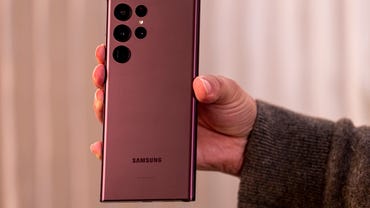
Display: 6.8 inches (3,088 x 1,440-pixel resolution) 120Hz Dynamic AMOLED | CPU: Qualcomm Snapdragon 8 Gen 1 | RAM: 12GB/16GB LPDDR5 | Internal Storage: 128GB/256GB/512GB/1TB | Rear cameras: 10MP rear f/4.9 telephoto with 10x optical zoom and second 10MP f/2.4 telephoto with 3x optical zoom, 108MP wide-angle camera, and 12MP f/2.2 ultra-wide camera (120-degree field-of-view) | Front camera: 40MP f/2.2 under-display camera | Weight: 229g | Dust/water resistance: IP68
Samsung’s Galaxy S22 Ultra is one of the best overall smartphones today and the best that Samsung has to offer for camera performance. With the S Pen now being incorporated into the phone, the Note lives on in the S22 Ultra so Note fans can finally rejoice in knowing a modern Note is now available.
If your job requires you to zoom into subjects from far away, no other phone beats the S22 Ultra in terms of telephoto capability and quality. Zooming up to 30x provides good quality images, but even beyond this zoom level, there are practical reasons to see details of the subjects you are shooting.
See the full review: Galaxy S22 Ultra review
While the camera hardware is the same as the S21 Ultra, Samsung worked to improve low-light shooting. A full entertainment display is also now available with the front-facing camera moving under the display. Don’t worry, this camera appears to be better than the first generation UDC found on the Z Fold 3.
Pros
- High quality and capable quad-camera system
- Best telephoto shooter available
- Full integrated S Pen support
- Incredible AMOLED display
Cons
Samsung Galaxy Z Fold 3 5G
Best foldable phone
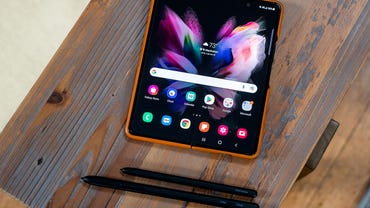
Main display: 7.6 inches (2,208 x 1,768-pixel resolution) Dynamic 120Hz AMOLED | Cover display: 6.2 inches (2268 x 832-pixel resolution) AMOLED | CPU: Qualcomm Snapdragon 888 | RAM: 12GB LPDDR5 | Internal Storage: 256GB/512GB, UFS 3.1 | Rear cameras: 12MP rear f/2.4 telephoto, 12MP f/1.8 wide-angle, and 12MP f/2.2 ultra-wide cameras (123-degree field-of-view) | Front cameras: 10MP f/2.2 on the cover display and 4MP under display camera on the main display | Weight: 271g
The Galaxy Z Fold 3 is the best overall phone for my needs. The addition of S Pen support and an IPX8 water-resistant design makes the Z Fold 3 the perfect phone and mini tablet I could ask for, and it is very well optimized for getting work done on the go.
Given the excellent pre-launch offers and trade-in deals, I purchased a 512GB model to serve as my daily driver. In addition to the hardware improvements, Samsung made the purchase a bit easier with a $200 price cut compared to the previous Z Fold 2.
The Galaxy Z Fold 3 serves as a very capable smartphone and small tablet, providing an extremely strong and fast 5G connection in both modes. The outside display offers a typical 6.2-inch smartphone experience with the addition of 120Hz refresh rate support this year. The large 7.6-inch main display is stunning with a 120Hz refresh rate, Samsung’s lovely AMOLED technology, and special S Pen support. What could be more perfect for a Note and foldable fan?
See the full review: Samsung Galaxy Z Fold 3 review
You get the fastest RAM and internal storage speeds available, S Pen support, water resistance, triple rear cameras, a 10MP front-facing camera, a unique 4MP under-display camera, and much more. The 4,400mAh battery easily gets you through a full day, even when using the large main screen.
Pros
- Stunning engineering marvel
- Incredible AMOLED displays
- S Pen support
- IPX8 water resistance
- Software optimizations for foldable and large display usage
Cons
- Expensive
- No S Pen support on cover screen
- Not the best Samsung cameras on the back
Google Pixel 6 Pro
Best Google phone
![]()
Display: 6.7 inches (3,120 x 1,440-pixel resolution) LTPO OLED | CPU: Google Tensor with Titan M2 security coprocessor | RAM: 12GB | Internal Storage: 128/256/512GB | Rear cameras: 50MP rear f/1.85 wide, 12MP f/2.2 ultra-wide (114-degree field-of-view), and 48MP telephoto with 4x optical | Front camera: 11.1MP f/2.2 | Weight: 210g | Dust/water resistance: IP68
Google’s Pixel 6 Pro is the best smartphone currently available from Google. The Pixel 6 has many of the same specifications, with one less camera on the back and a slightly smaller display. The Pixel 6 and 6 Pro sport Google’s new Tensor processor.
The Pixel 6 Pro is a flagship competitor and starts at $899 for the 128GB model with the 512GB model priced at $1,099. You can purchase one in Stormy Black, Cloudy White, or Sorta Sunny with some limitations on storage capacity with the different color options.
The cameras are clearly the focus of the Pixel 6 Pro with Google’s amazing software, combined with leading hardware, to create arguably the best smartphone camera experience available today.
See the full review: Google Pixel 6 Pro review
In addition to the camera prowess, the phone is assured of receiving regular and timely software and firmware updates for years, similar to what Apple offers to iPhone owners. The phone is also powered by Android 12 with several optimizations for a personalized experience.
Pros
- Fantastic camera experiences
- Optimized Android 12 interface
- Timely updates and support for years
- Unique hardware design
Cons
- Average battery life
- RF performance not as good as Samsung
OnePlus 10 Pro
Best Samsung alternative
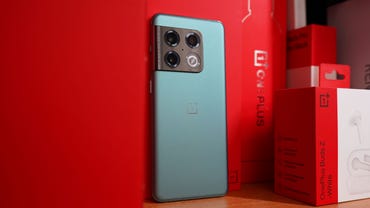
Display: 6.7 inches (3,216 x 1,440-pixel resolution) 120Hz AMOLED | CPU: Qualcomm Snapdragon 8 Gen 1 | RAM: 8GB/12GB LPDDR5 | Internal Storage: 128GB/256GB | Rear cameras: 48MP wide-angle, 50MP ultra-wide angle (150˚), 8MP telephoto (3.3x optical zoom, OIS) | Front camera: 32MP f/2.2 camera | Weight: 200.5g
OnePlus used to be the “flagship killer” brand but has since evolved into higher-priced flagships directly challenging the likes of Samsung and Apple. Compared to Samsung, OnePlus offers an experience that is free from ads and bloatware while also now providing some interesting features such as reverse wireless charging and adaptive 120Hz displays.
The OnePlus 10 Pro is priced in a much more competitive range than last year. At $899, the device is in-line with Google’s flagship, the Pixel 6 Pro, and undercuts Samsung’s S22 Plus and Ultra handsets. Still, OnePlus has managed to cram in specs that go tit for tat with the more expensive rivals.
See the full review: OnePlus 10 Pro review
We’ve hit year two of the brand’s partnership with Swedish camera-maker Hasselblad and the latest update comes in the form of the 50-megapixel ultra-wide lens. With it, you can capture as wide as 150-degrees of imagery, which makes the OnePlus 10 Pro a stellar pick for landscape photography. Additionally, photos and videos look true-to-life thanks to the natural color-tuning by Hasselblad.
One area that OnePlus leads the pack in is the charging capability of its phones. SuperVOOC 65 support and Warp Charge Wireless 50 support are provided in the OnePlus 10 Pro. This means you can charge up your phone from 1% to 100% in just 29 minutes. The wireless charging even achieves this charging performance in 43 minutes, which is faster than wired charging of most other phones. In countries outside of the US, the OnePlus 10 Pro offers a whooping 80W charging speed.
Pros
- Lovely, high-quality design
- Ultra-fast wireless and wired charging capability
- Bloatware-free software
- One of the best ultra-wide cameras on the market
Cons
- Storage and RAM configuration is limited to 8GB/128GB in the US
- Hasselblad influence is still limited to software
- Software experience is ever-changing
Samsung Galaxy S21 FE
Best value Android phone
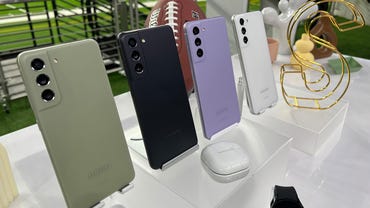
Display: 6.5 inches (3×200 x 1×440-pixel resolution) 120Hz AMOLED | CPU: Qualcomm Snapdragon 888 | RAM: 6-8GB LPDDR5 | Internal Storage: 128-256GB storage (with microSD card) | Rear cameras: 8MP rear f/2.4 telephoto, 12MP f/1.8 wide-angle camera, and 12MP f/2.2 ultra-wide camera (123-degree field-of-view) | Front camera: 32MP f/2.2 camera | Weight: 177g | Dust/water resistance: IP68
While the Galaxy S22 series provide compelling options, they are flagship phones priced in the $800 and higher range. In order to offer customers another alternative, Samsung released the. Galaxy S21 FE (Fan Edition) phone. The S21 FE is available in four unique colors to suit your style.
Priced at $699.99, you may think Samsung compromised a lot to offer a powerful 5G phone. However, we see a 6.4-inch Dynamic AMOLED display with 120Hz dynamic refresh rate, high-end Qualcomm Snapdragon 888 processor, large capacity 4500mAh battery, 6 or 8GB of RAM, 128 or 256GB storage with a microSD card slot, IP68 dust/water resistance, three rear cameras (one with 3X optical and 30x super-resolution zoom), and a high resolution 32MP front camera.
See the full review: Samsung Galaxy S21 FE 5G review
Where are the compromises? Exactly, there really aren’t any and yet the $700 price is where we see phones in the upper mid-range with less capable specs appear. The S21 FE challenges Google’s new Pixel 6 and other phones.
Pros
- Full Samsung experience
- Affordable and colorful
- High level of dust/water resistance
- Good quality cameras
Cons
- Plastic back panel
- Google Pixel 6 is a serious challenger
Google Pixel 5a with 5G
Best mid-range Android phone
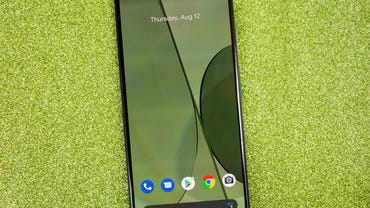
Display: 6.34 inches (2,400 x 1,080-pixel resolution) OLED | CPU: Qualcomm Snapdragon 765G | RAM: 6GB | Internal Storage: 128GB | Rear cameras: 12.2MP rear f/1.7 and 16MP f/2.2 ultra-wide (118.7-degree field-of-view) | Front camera: 8MP f/2.0 | Weight: 183g | Dust/water resistance: IP67
Google’s Pixel 5a with 5G checks the boxes needed for a competitive smartphone. Unlike past Pixel phones, it is not designed to compete with the high-end flagships from Apple, Samsung, and others, but it provides the essentials along with Google’s software chops.
Google’s past Pixel phones always lacked some features and couldn’t compete with Apple and Samsung flagships — so this approach makes much more sense. Priced at just $449 ($399 currently for Black Friday), the Pixel 5a is a great option for getting 5G into your hands with Google’s software and reliance on regular updates for years.
See the full review: Google Pixel 5a review
It is available only in black color with one storage capacity option. The back is aluminum, and we also see the return of a rear fingerprint sensor, which is a fan favorite.
Pros
- A very affordable mid-range smartphone
- Timely updates and support for years
- High level of water resistance
- Outstanding camera performance, largely due to Google software
Cons
Microsoft Surface Duo 2
Best updated design (still with a limited target market)
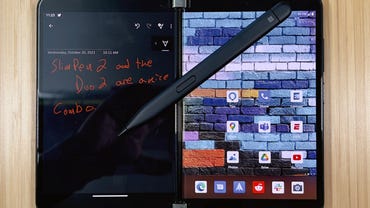
Displays: Two-5.8 inch (1,892 x 1,344-pixel resolution) AMOLED | CPU: Qualcomm Snapdragon 888 | RAM: 8GB | Internal Storage: 128GB/256GB/512GB | Cameras: 12MP f/21.7 wide, 12MP f/2.4 telephoto with 2x optical, and 16MP f/2.2 ultra-wide (110-degrees field-of-view). 12MP f/2.0 front-facing camera | Weight: 284g
The original Surface Duo suffered from old and missing basic specifications while launching a unique form factor that was much more than just a smartphone. Microsoft listened to feedback and offers significant improvements in the specifications this year so that the Surface Duo 2 matches other flagship smartphones in 2021.
However, the focus on this phone is still on productivity, and it is perfect for those who multi-task and need to use two apps at the same time. The issue for Microsoft is whether or not there is a sustainable market for a device fit for these specific customers.
See the full review: Microsoft Surface Duo 2 review
The story is not about just the improved hardware, though, and this smartphone’s capability rests in the software enhancements offered by Microsoft. There were a few updates for the original Duo, but that device still runs Android 10, with Android 12 now present on the newest smartphones. The $1,500 starting price is tough to swallow, but maybe we will soon see fire sales on this second generation as we saw with the first generation.
Pros
- High-quality hardware
- Capable software for multi-tasking experiences
- Intuitive gestures
- Stylus support
Cons
- Expensive
- A poor history of software updates
- Average camera performance
Sony Xperia 1 III
Best Sony Android phone
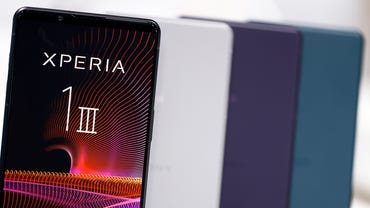
Display: 6.5 inches (3,840 x 1,644-pixel resolution) 120Hz AMOLED | CPU: Qualcomm Snapdragon 888 | RAM: 12GB LPDDR5 | Internal Storage: 256GB with microSD card slot | Rear cameras: 12MP rear f/1.7, 12MP dual focal length f/2.3 and f/2.8 telephoto, and 12MP f/2.2 ultra-wide camera (124-degree field-of-view) | Front camera: 8MP f/2.0 camera | Weight: 187g | Dust/water resistance: IP68
The Sony Xperia 1 III, spoken as the “one mark three,” was recently announced by Sony and will be available in October for an MSRP of $1,299.99. It brings some features rarely seen in smartphones today, including a 3.5mm audio port and microSD card slot. It also has a dedicated camera shutter button, making this more of an advanced camera with phone parts.
The new Sony Xperia 1 III is focused on the media experience with a 3.5mm audio port, true front-facing stereo speakers, three rear cameras, and Sony gaming features.
Sony is providing this phone for those looking to explore the camera experience with three camera applications and many elements from the Sony Alpha camera series included in the phone. Zeiss optics are calibrated for the Xperia phone. It is not optimized for simple point and shoot with auto mode only but is sure to please the imaging fan with advanced software and a dedicated camera shutter hardware button just where you need it to capture content.
Pros
- High quality and capable camera system
- 4K display
- IP68 dust/water resistant
- Audio port and microSD card
Cons
- Expensive
- Focused on advanced photographers
How did we choose these smartphones?
The process to make our smartphone selections includes testing the phones for weeks, reading reviews from other websites and publications, researching reviewer guides and manufacturer websites, talking with colleagues and other users who have hands-on experience with the smartphones, and then selecting the best from all of the available choices.
Over the past year, we tested new Android phones from Google, Samsung, OnePlus, Sony, TCL, and several others.
What is the best Android phone?
The best Android phone is the Samsung Galaxy S22 Ultra due to its beautiful AMOLED display, powerful CPU, and state-of-the-art camera.
Which Android phone is right for you?
All of these phones run the same base operating system, but the user interface ranges from stock Android to more elaborate options. So first, you need to figure out which fits your needs best.
Camera performance across the board is solid from just about every phone in the list, but some are better than others. If you plan to capture photos as your primary function, then you should look to Google, Samsung, Sony, or OnePlus.
If you plan to spend $1,000 or more, then you may also want your phone to last for at least a couple of years. You should consider companies with a good track record of regular updates, notably Google and Samsung.
What’s your daily driver and why?
After testing out many phones over the past couple of years, my daily driver remains the Samsung Galaxy Z Fold 3 because it is a productivity workhorse with cameras that provide what I need (even if they are not the best cameras available). The big main display, support for the S Pen, reliable side fingerprint sensor, software optimized for multi-tasking, flawless performance, and amazing engineering convince me daily that the Z Fold 3 is the perfect device for me.
It’s a big phone, so I don’t run with it. Thankfully, wearables have evolved over time, so I can still run with something like my Galaxy Watch 4 with LTE and stay connected while I am away from my phone.
I tried the Google Pixel 6 Pro, but I sent it back after two weeks of testing. It’s just not the phone for me despite its camera prowess.






